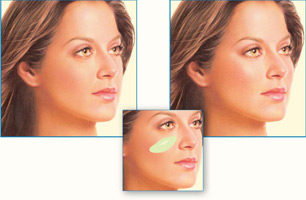

| Up |
|
Facial implants are specially formed solid, biocompatible materials designed to enhance or augment the physical structure of your face. The precise type and size of implants best suited for you requires an evaluation of your goals, the features you wish to correct and your surgeon’s judgment. PLANNING YOUR SURGERY The initial consultation with your doctor or Cosmetic Surgery Advisor is very important. The doctor or Cosmetic Surgery Advisor will need your complete medical history, so check your own records ahead of time and be ready to provide this information. Be sure to inform your doctor or Cosmetic Surgery Advisor if you have any allergies; if you're taking any vitamins, medications (prescription or over-the-counter), or other drugs; and if you smoke. Your doctor or Cosmetic Surgery Advisor will explain the techniques and anaesthesia he or she will use, the type of facility where the surgery will be performed, and the risks and costs involved. PREPARING FOR YOUR SURGERY Your doctor or Cosmetic Surgery Advisor will give you specific instructions on how to prepare for surgery, including guidelines on eating and drinking, smoking, and taking or avoiding certain vitamins and medications. Carefully following these instructions will help your surgery go more smoothly. WHERE YOUR SURGERY WILL BE PERFORMED A operation may be performed in a surgeon's centre. TYPES OF ANESTHESIA Most facial implants operations are performed a general anaesthesia. In that case, you'll sleep through the operation. THE SURGERY 
Chin implants can increase the size and projection of a chin that does not project in proportion with the forehead and mid-face. A small or recessed chin can also be described as one that seems to disappear into the neck of an individual of normal weight, rather than appearing as a distinct facial feature. For a chin implant, the incision may be inside or outside your mouth, along the crease that joins your lower lip and gums. An incision just beneath the chin is an alternative. 
Cheek implants increase the projection of the cheekbones. They add volume to areas which may be recessed or flat. The specific area to be augmented in the cheek determines where an implant will be positioned on the cheekbone. Cheek implants are most often placed through incisions in the mouth. When performed with other procedures, alternate incisions may be recommended including placement through an incision inside the lower eyelid or one within the hairline. Your incisions will be closed with absorbable sutures or stitches that will be removed within 1-2 weeks following your surgery. AFTER YOUR SURGERY There isn't usually significant discomfort after surgery; if there is, it can be lessened with the pain medication prescribed by your surgeon. (Severe or persistent pain or a sudden swelling of your face should be reported to your surgeon immediately.) Some numbness of the skin is quite normal; it will disappear in a few weeks or months. Your doctor may tell you to keep your head elevated and as still as possible for a couple of days after surgery, to keep the swelling down. If you've had a drainage tube inserted, it will be removed one or two days after surgery. Bandages, when used, are usually removed after one to five days. Don't be surprised at the pale, bruised, and puffy face you see. Just keep in mind that in a few weeks you'll be looking normal. ALL SURGERY CARRIES SOME UNCERTAINTY AND RISK When a operation is performed by a qualified plastic surgeon, complications are infrequent and usually minor. Still, individuals vary greatly in their anatomy, their physical reactions, and their healing abilities, and the outcome is never completely predictable. Complications that can occur include hematoma (a collection of blood under the skin that must be removed by the surgeon), injury to the nerves that control facial muscles (usually temporary), infection, and reactions to the anaesthesia. Poor healing of the skin is most likely to affect smokers. |
|
Reval Clinic - KT Kliinik
Kaluritee 5A Tallinn ESTONIA
Email: revalclinic@revalclinic.com
|